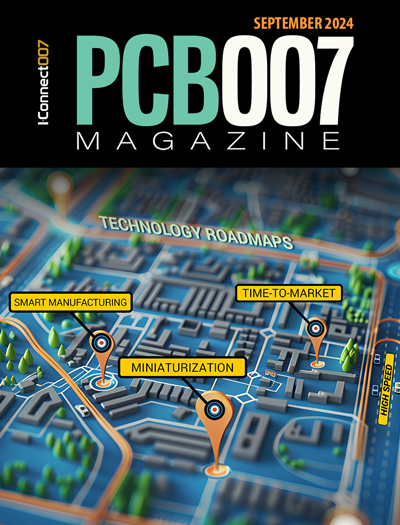-

- News
- Books
Featured Books
- pcb007 Magazine
Latest Issues
Current Issue
Engineering Economics
The real cost to manufacture a PCB encompasses everything that goes into making the product: the materials and other value-added supplies, machine and personnel costs, and most importantly, your quality. A hard look at real costs seems wholly appropriate.

Alternate Metallization Processes
Traditional electroless copper and electroless copper immersion gold have been primary PCB plating methods for decades. But alternative plating metals and processes have been introduced over the past few years as miniaturization and advanced packaging continue to develop.

Technology Roadmaps
In this issue of PCB007 Magazine, we discuss technology roadmaps and what they mean for our businesses, providing context to the all-important question: What is my company’s technology roadmap?
- Articles
- Columns
Search Console
- Links
- Media kit
||| MENU - pcb007 Magazine
Indian PCB Market to Reach $5.35 Billion by 2023
December 21, 2018 | Globe NewswireEstimated reading time: 2 minutes
The printed circuit board (PCB) market in India was worth US$ 2.02 billion in 2017. PCBs are non-conductive, copper laminated boards that help to connect electronic and electrical components without the use of wires. These boards are composed of epoxy, fiberglass and other composite materials which reduce the complexity of the overall circuit design. PCBs are installed in various electronic products, ranging from consumer gadgets, such as PCs, tablets, smartphones and gaming consoles, to industrial and high-tech products.
Over the past few years, the demand for PCBs in India has witnessed a steady rise on account of increasing investment in digitization and favorable government initiatives.
Looking forward, this market is projected to cross $5.35 Billion by 2023, exhibiting a CAGR of 17.7% during 2018-2023.
Indian Printed Circuit Board (PCB) Market: Drivers
India represents one of the largest and fastest growing consumer electronics market in the Asia Pacific region. Computers, laptops, mobile phones, etc. often use rigid PCBs in areas vital to the functionality of these devices, such as the motherboard, thereby creating a positive impact on the growth of the PCB industry.
PCBs find application in large number of industries which includes electronic products, automotive (dashboards, engine management system, power supplies etc.), medical (heart monitors, imaging probes, drug metering devices), defence (radar, armoured car control and security), lighting, broadcasting, Aerospace etc. It represents the foundation of a majority of electronic products and continues to evolve into new industries and applications.
The advancements made in the PCB functionalities and manufacturing along with the miniaturisation of semiconductor devices are expected to drive the demand for more complex PCBs with higher number of layers.
The Government of India is strongly encouraging the manufacturing and usage of PCBs in the country. It has launched many initiatives such as Make in India', Digital India' etc. Under these schemes, the government aims to encourage manufacturers to set up more local plants in the country by easing tax regime, reducing bureaucratic hurdles, etc. This is expected to bring in significant achievement in various end-use industries (automotive, electrical, etc.), thereby creating a positive impact on the overall PCB demand.
PCBs are the backbone of the electronics industry as it is deployed in almost all the electronic products from consumer gadgets to industrial high-tech products. The Indian electronic devices market has witnessed double digit growth rates driven by rising disposable incomes and increasing urbanization levels in the country. This coupled with miniaturization of semiconductor devices and enhanced functionality in electronic products is expected to drive the demand for more complex PCBs in the near future.
PCBs represent a fundamental component for the manufacturing of devices which are required for military navigation, guidance and control, electronic warfare, missiles and surveillance, and communication. India currently has the 5th largest defense budget in the world and these figures are expected to increase continuously over the next five years. Moreover, catalyzed by rising demand and increasing government initiatives, the defense equipment manufacturing industry in the country is also undergoing strong growth. This is also expected to drive the demand of PCBs in the next five years.
Suggested Items
Fresh PCB Concepts: PCB Design Essentials for Electric Vehicle Charging
11/27/2024 | Team NCAB -- Column: Fresh PCB ConceptsElectric vehicles (EVs), powered by electricity rather than fossil fuels, are transforming transportation and reducing environmental impacts. But what good is an EV if it can't be easily charged? In this month's column, Ramon Roche dives into the role of printed circuit boards (PCBs) in electric vehicle charging (EVC)—and the design considerations.
Unlocking Advanced Circuitry Through Liquid Metal Ink
10/31/2024 | I-Connect007 Editorial TeamPCB UHDI technologist John Johnson of American Standard Circuits discusses the evolving landscape of electronics manufacturing and the critical role of innovation, specifically liquid metal ink technology, as an alternate process to traditional metallization in PCB fabrication to achieve ever finer features and tighter tolerances. The discussion highlights the benefits of reliability, efficiency, and yields as a tradeoff to any increased cost to run the process. As this technology becomes better understood and accepted, even sought out by customers and designers, John says there is a move toward mainstream incorporation.
Fresh PCB Concepts: The Critical Nature of Copper Thickness on PCBs
10/31/2024 | Team NCAB -- Column: Fresh PCB ConceptsPCBs are the backbone of modern electronics and the copper layers within these boards serve as the primary pathways for electrical signals. When designing and manufacturing PCBs, copper thickness is one of the most critical factors and significantly affects the board’s performance and durability. The IPC-6012F specification, the industry standard for the performance and qualification of rigid PCBs, sets clear guidelines on copper thickness to ensure reliability in different environments and applications.
Book Excerpt: The Printed Circuit Designer’s Guide to... DFM Essentials, Ch. 1
10/25/2024 | I-Connect007The guidelines offered in this book are based on both ASC recommendations and IPC standards with the understanding that some may require adjustment based on the material set, fabricator processes, and other design constraints. This chapter details high-frequency materials, copper foil types, metal core PCBs, and the benefits of embedded capacitance and resistor materials in multilayer PCBs.
The Cost-Benefit Analysis of Direct Metallization
10/21/2024 | Carmichael Gugliotti, MacDermid AlphaCarmichael Gugliotti of MacDermid Alpha discusses the innovative realm of direct metallization technology, its numerous applications, and significant advantages over traditional processes. Carmichael offers an in-depth look at how direct metallization, through developments such as Blackhole and Shadow, is revolutionizing PCB manufacturing by enhancing efficiency, sustainability, and cost-effectiveness. From its origins in the 1980s to its application in cutting-edge, high-density interconnects and its pivotal role in sustainability, this discussion sheds light on how direct metallization shapes the future of PCB manufacturing across various industries, including automotive, consumer electronics, and beyond.


